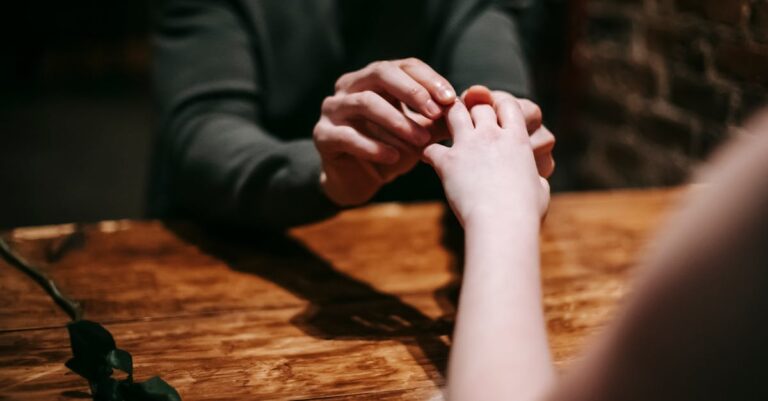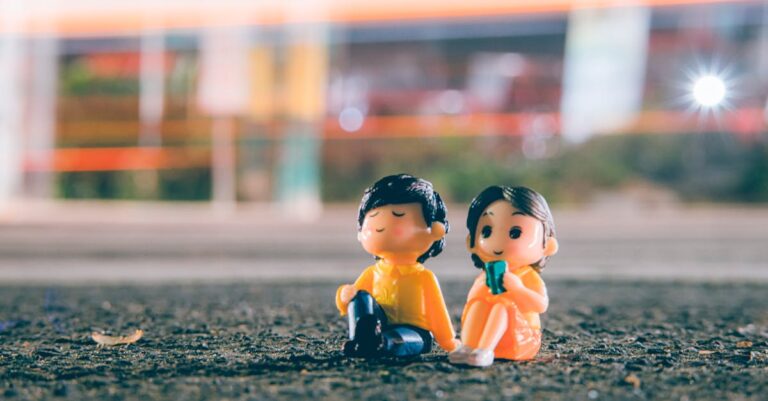
The first time she saw him, Clara was kneading dough in the dim glow of the bakery’s early morning light. The door jingled, and the scent of fresh sourdough thickened in the air. He stood in the threshold, coat damp from rain, eyes scanning the room like a man searching for something he’d lost. She didn’t look up—just kept pressing the dough, her hands moving on instinct. But she heard it: the soft click of his boots on the floor, the way his breath hitched when he caught the smell of cinnamon and butter.
“I’ll take two loaves,” he said, voice low, steady.
She nodded, tossing a rolled-up newspaper over the counter. “That’ll be six-fifty.”
He hesitated. “Do you ever… close early?”
She glanced up then, studying him. His hair was dark, damp at the temples, and his jacket hung loose on his frame. A guitar case leaned against the wall near the door, its edges scuffed, its leather cracked with age. “Depends,” she said. “Why?”
He didn’t answer right away. Instead, he stepped closer, fingers brushing the edge of the counter. The smell of rain and something sharper—maybe smoke, maybe something else—hung around him. “I’m staying in town for a while,” he said. “Just… need a place to sleep.”
Clara’s gaze flicked to the clock. 5:47 a.m. The bakery would be empty for another hour. She thought of the spare room, the creak in the floorboards, the way the window faced the alley where trash cans clattered at dawn. She thought of the man standing there, waiting, and something in her shifted.
“Come back at seven,” she said. “I’ll have a room ready.”
He smiled then, slow and tired, like he’d been expecting that answer all along.
—
By the time he returned, the bakery was alive with heat and noise. The oven roared, the flour dusted the air in golden clouds, and Clara’s hands were raw from shaping loaves. She didn’t look up when he entered, but she felt him—his presence a weight against the hum of the kitchen.
“You’re early,” she said, not turning.
“I figured I’d help.”
She turned then, raising an eyebrow. “With what?”
He gestured to the counter, where a row of pastries sat cooling. “That. Or maybe the dishes. Or… whatever you need.”
Clara studied him. His hands were calloused, his sleeves rolled up to his elbows, revealing a tattoo that curled around his forearm—a single line of ink, too small to read from across the room. She wondered what it meant, but didn’t ask. Instead, she pointed to a stack of dishes in the sink. “Wash those.”
He moved without protest, rolling up his sleeves, the water running cold as he scrubbed. Clara watched him for a moment, the way his shoulders moved under his shirt, the way he hummed under his breath—something low and off-key, like a song he’d known since childhood.
“You play?” she asked, nodding toward the guitar case.
He glanced up, surprised. “Yeah. A little.”
“Play something,” she said.
He hesitated, then reached for the case. The moment he lifted the guitar, the room changed. The air thickened, the light dimmed, and the sound that came out of the strings was like a memory—soft, aching, full of things left unsaid. Clara stopped moving. She didn’t know the song, but she felt it in her bones, in the way her fingers curled against the counter, in the way her breath caught when the melody rose and fell.
When he finished, he set the guitar down and looked at her. “You don’t laugh,” he said.
She shook her head. “I don’t know why.”
He smiled again, but this time it didn’t feel like an answer. It felt like a question.
—
They didn’t talk much after that. Not in the way people usually do. There was no small talk about the weather or the town or the kind of music he played. Instead, there was a rhythm to their days—her rising before dawn, him arriving just as the first light spilled over the horizon. They worked side by side, her hands shaping dough, his fingers tracing chords on the worn wood of the guitar. Sometimes he played while she baked, the sound weaving through the heat of the ovens, through the scent of cinnamon and sugar. Sometimes she sang, voice rough around the edges, harmonizing with the notes he played.
The town noticed. Whispers followed them wherever they went—how the baker had taken in a stranger, how the musician had stayed longer than anyone expected. Some said it was a mistake. Others said it was something else entirely. But Clara didn’t care. She cared about the way his laughter sounded when he caught her off guard, about the way he watched her when she thought he wasn’t looking. She cared about the quiet moments, the ones that felt like secrets between them.
One night, after the bakery had closed and the streets were empty, they sat on the steps outside, the sky bruised with twilight. The air was cool, carrying the scent of rain and distant thunder. Clara leaned her head against his shoulder, feeling the warmth of his skin through his shirt.
“You’re not like anyone I’ve known,” she said.
He didn’t answer right away. Instead, he reached for her hand, lacing his fingers through hers. His grip was steady, sure. “I’m not sure I know anyone like you,” he said.
She didn’t say anything. She didn’t need to. The words were there, in the silence between them, in the way the sky seemed to hold its breath.
—
The trouble came on a Tuesday. A letter arrived, sealed with black wax and addressed to him by a name she didn’t recognize. He read it in the kitchen, his face going still, his hands tightening around the paper until it crinkled. Clara watched from the doorway, her fingers curling into her palms.
“It’s from my brother,” he said, voice flat. “He’s in trouble.”
She didn’t ask what kind of trouble. She didn’t need to. The way he said it—like a weight he’d been carrying for years—was enough.
“You have to go,” she said.
He looked at her, eyes dark with something she couldn’t name. “I don’t want to.”
She stepped closer, her voice soft. “I know.”
He didn’t ask her to come. She didn’t ask him to stay. They stood there, the space between them filled with everything unsaid, with the sound of the oven ticking in the background, with the weight of a decision that had already been made.
When he left, it was before dawn. The bakery was quiet, the air still heavy with the scent of bread and something else—something Clara couldn’t quite name. She stood at the door, watching as he disappeared into the morning, his figure swallowed by the light.
—
The days after were different. The bakery felt too big, the silence too loud. Clara went through the motions—kneading dough, baking pastries, sweeping the floors—but nothing felt real. She told herself it was just the absence, just the way things changed when someone left. But deep down, she knew it was something else.
She thought about him often. About the way he played, about the way he looked at her when no one was watching. She thought about the nights they’d spent sitting on the steps, talking in whispers, about the way he’d held her hand like it was the only thing that mattered.
One evening, she found a letter on the counter. It was addressed to her, the ink smudged, the paper yellowed with age. She recognized his handwriting immediately.
“I’m sorry,” it read. “I didn’t think it would hurt this much.”
She didn’t cry. She didn’t say anything. She just folded the letter and tucked it into her pocket, like a secret she’d carry forever.
—
Months passed. The bakery kept running, the town kept turning, and Clara kept moving forward. She didn’t wait for him. She didn’t look for him. But sometimes, when the air was just right and the sun hit the windows at a certain angle, she’d catch a note in the wind—something familiar, something that made her heart skip a beat.
She never knew if it was real or just her imagination. But she didn’t mind. Some things were better left as whispers, as memories that lingered in the air like the scent of bread baking in the oven.
And maybe, just maybe, she was still waiting. Not for him, but for the feeling—the one that had stayed with her, even after he was gone.


